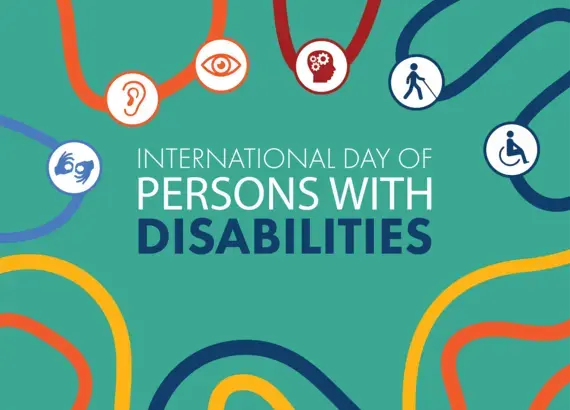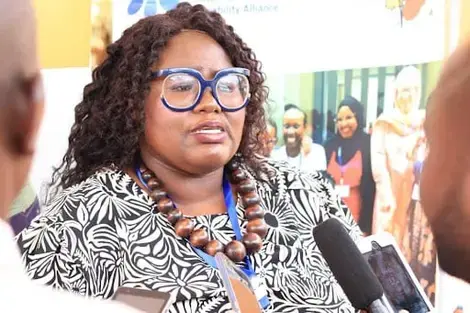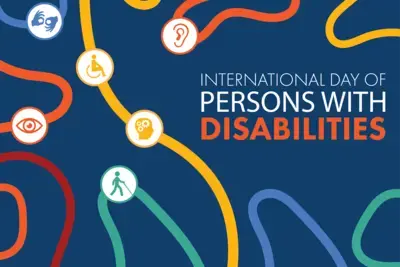
Success Story
Elevating the Diverse Voices of African Women with Disabilities
In recognition of the International Day of People with Disabilities last month, NDI is highlighting the essential work of partners who are at the forefront of fighting for greater levels of equality and organizing to shift social norms and perceptions and reduce barriers to political participation for persons with disabilities.

Ruth Mkutumula, DIWA’s Executive Director, delivering a speech on promoting access to justice for women with disabilities in Malawi.
Disabled Women in Africa (DIWA), an NDI partner in Malawi, has pioneered efforts to amplify the perspectives of women with disabilities across Africa and elevate their voices in decision-making spaces. DIWA is an organization led by women with disabilities dedicated to strengthening the rights of African women and girls with disabilities through research, networking, partnerships and fostering unity in diversity. In April 2024, with support from NDI and Women Enabled International (WEI), DIWA established a network of women and girls with disabilities (NEGWDM) to enhance the visibility, representation, and leadership of women and girls with disabilities in public discourse across the region. As part of this effort, DIWA co-authored a groundbreaking report to highlight the voices and experiences of women and gender-diverse individuals with disabilities across 23 African countries. Ruth Mkutumula, DIWA’s Executive Director, shared her insights from the report and reflections on the barriers and opportunities for strengthening the rights of African women with disabilities.
What are some of the persistent gaps limiting the participation and inclusion of African women with disabilities in decision-making processes?
In October 2024, DIWA and its partners Humanity Inclusion (HI), World Federation of the Deaf (WFD), and International Disability Alliance (IDA) launched a report on African women with disabilities, ahead of consultations with African women 30 years after the Beijing Platform for Action (BPFA). The report reveals that women with disabilities, as well as women without disabilities, have been long excluded from decision making systems, including in politics, in the economy, in their community and families, and in civil society spaces. Their exclusion is the result of multiple mutually reinforcing causal factors. For women with disabilities, the intersection of age, geographic location, level of education, type of disability, and financial status serve to deepen the extent of their exclusion.
The report further revealed that while gender equality in decision-making systems has been improving globally since 1995, women with disabilities are still largely overlooked in related efforts. It is true that the Convention on the Elimination of All Forms of Discrimination Against Women (CEDAW) has been long promoting temporary special measures to accelerate women’s participation in politics, such as reserved seat quotas or political party or candidate quotas. However, as of 2022, only 34 countries out of 54 were applying “gender quotas” in Africa.
Likewise, the movement for gender quotas has not yet started benefitting women with disabilities. In 2022, in Burundi, Cameroon, Kenya, Nigeria, Rwanda and Uganda, there were no women with disabilities in Parliament that had not been either nominated or elected within a disability-specific scheme. The BPFA calls for the equal participation of women in political, public and private life, ensuring they have equal opportunities to hold leadership roles in governments, parliaments, and other decision-making bodies. It also emphasizes the need to increase women's ability to participate by providing them with education, training, and leadership development opportunities. Despite these calls, in 2022, there were fewer than five women with disabilities serving in parliaments across Africa.
In this report, women with disabilities shared their experiences that systemic barriers, such as inaccessible spaces, programs, physical environments, communication formats and documents, hinder their effective participation in decision-making spaces. For example, as a woman with a visual disability, my need for accessible documents or tools is often ignored or forgotten. In political processes, party manifestos, brochures, and other materials are rarely available in large print or accompanied by magnifiers. Even at polling stations, large-print voter registers are unavailable and decision-making meetings rarely provide materials in accessible formats. These experiences resonated with the perspectives of various women with disabilities from 23 African countries whom we interviewed for this report. These gaps create significant challenges for women with disabilities, limiting their ability to participate meaningfully in decision-making processes and platforms.
Moreover, women with disabilities are often excluded from consultations regarding their capabilities and are rarely considered or recommended for positions of influence. Their representation in decision-making roles remains minimal and is further compounded by the absence of affirmative action, policies, or legal frameworks to support their meaningful participation in decision-making processes.
Unfortunately, ableism continues to be evident in mainstream civil society spaces, often manifesting in assumptions about the capabilities of women with disabilities. Their skills, experiences, and leadership potential are frequently underestimated, and even when they possess relevant education, they are often overlooked or undervalued. Opportunities are sometimes provided out of pity or to meet specific requirements rather than on the basis of merit or human rights principles.
I see lots of opportunities in the feminist and women’s rights organizations and spaces, which are crucial to support women with disabilities. Women's rights movements and organizations are vital allies to support the inclusion of women with disabilities in decision making spaces, yet these movements often do not consider the inclusion of women with disabilities. It will take our persistent advocacy to bring awareness and increase buy-in of these women’s rights platforms to openly consider disability rights and become more inclusive of women with disabilities. In these spaces, there is also a tendency to ignore mentioning women with disabilities due to a lack of understanding of their specific needs and the unique barriers they experience. For instance, despite our report submission regarding women with disabilities, there is no mention of women with disabilities in the African Union’s common position paper for the Beijing +30 review.
What recommendations do you have for meaningfully engaging women with disabilities in political life?
While the BPFA stresses that women’s involvement is essential for achieving broader goals of equality, development, and peace, it's important to be intentional about including women with disabilities in decision-making.
Legal documents, policies, and frameworks must address and support the participation of women with disabilities in decision making processes and political life.
We must develop the capabilities of women with disabilities through leadership training programs focusing on decision-making, strategic thinking, and public speaking. The report also recommends developing knowledge of political participation among women with disabilities.
I believe partnerships and collaboration with feminist and women rights organizations must be deliberately formed and strengthened. This will contribute to leveraging and building upon their shared expertise, resources, opportunities, and spaces for women with disabilities to expand their influence and alliances.
Lastly, working with women with disabilities through their platforms and networks is crucial. This is critical for obtaining their input and position on certain issues, as well as for taking into consideration their expertise, lived experiences and realities, and for giving a chance to women with diverse types of disabilities to participate at different stages in decision-making processes.


